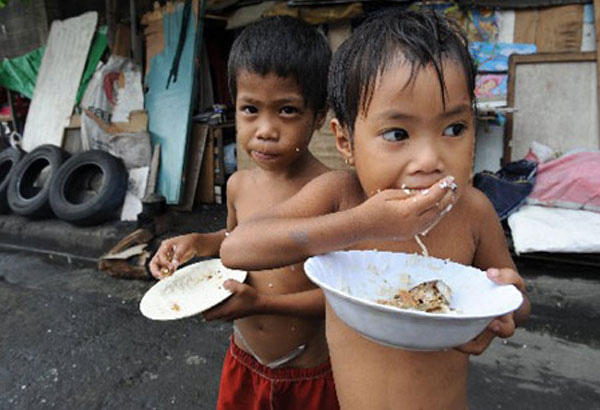Malnutrition pulls down Philippines' ‘End of Childhood’ rank to 96th

The Philippines barely scraped into the top 100 countries for a child to grow up in, according to the 2017 End of Childhood Survey. File
MANILA, Philippines - The Philippines barely scraped into the top 100 countries for a child to grow up in, according to the 2017 End of Childhood Survey.
The survey, conducted by international child welfare organization Save the Children, ranked the best and worst countries for children to be born in.
Ranking 96th in a survey that covered 172 countries, the Philippines was behind neighbors Vietnam, Thailand and Malaysia, and marginally above Indonesia, 101; Cambodia, 117; and Myanmar, 112.
The survey found the childhoods of many Filipino children were cut short due to death before the age of five, while many teenage girls became early mothers at age 15 to 19.
Save the Children yesterday launched its Stolen Childhoods report, based on the 2017 End of Childhood Survey, to coincide with International Children’s Day. The report examined each country against an End of Childhood Index, which has eight indicators that impact children’s ability to have a safe, happy childhood, including rates of child mortality, under-nutrition, school drop out rates and early marriage.
The Philippines performed poorly on child stunting or chronic malnutrition, which affects more than 30 percent of children across the country; child mortality or children dying before they reached the age of five, which constitutes 28 percent of deaths per 1,000 live births; and teenage pregnancy, with the country’s 62.7 percent adolescent birth rate.
Ed Olney, Save the Children Philippines country director, said the country’s score in the three indicators was alarming, as it showed the Philippines being left behind by its regional neighbors who were improving.
“It’s very alarming, particularly on teen pregnancy which is trending negatively,” Olney told The STAR, comparing the results to the 2007 figures. “It’s not improving, meaning the country was better off 10 years ago. It shows something wrong is going on here.”
Olney noted that the Philippines’ results were worse than that of Malaysia, Vietnam and Thailand – three countries that were poorer than the Philippines 20 years ago.
He noted that Vietnam had only just emerged from the ashes of the Vietnam War with the United States several decades ago.
Norway and Slovenia topped the Index, followed by Finland, with Niger ranking last.
“The ranking is not so surprising when you look at the levels of stunting and under-nutrition across the country. Under-nutrition accounts for more than half of the 95 daily child deaths among children under five in the Philippines,” said Olney.
“Philippines has made tremendous economic and development progress in recent years, but poverty rates have remained the same over the last few years. Economic growth has been poorly distributed,” he said.
“Disappointing statistics from the Philippines underscore the importance of the first 1000 days of a child’s life, when they are most susceptible to stunting and most in need of good nutrition. This is an area that must be dramatically improved if the Philippines is to move up the rankings, and most importantly, ensure every child across the country can benefit from a safe and happy childhood.”
Children suffering from under-nutrition or stunting have increased risk of contracting diseases like acute diarrheal syndrome, acute respiratory infection and anemia, and those with severe under-nutrition are more likely to die from illnesses caused by complications. Children who are stunted in the first two years of life are also more likely to repeat grades, delay school entry or drop out of school.
Save the Children’s “Cost of Hunger: Philippines” 2016 study put the cost of under-nutrition to the economy of the Philippines at over P320 billion per year – equivalent to almost three percent of GDP.
Save the Children is calling for greater investment in activities that prevent under-nutrition and stunting. This includes more targeted nutrition support for the poorest and most marginalized groups, and greater investment in nutrition interventions for pregnant and lactating mothers and babies in their first 1000 days.
“Our report clearly shows that poor nutrition levels which cause stunting is holding children back in the Philippines, and preventing them from having the childhoods they deserve and are entitled to,” Olney said.
- Latest
- Trending
































